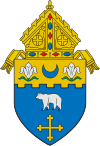Edwin Vincent O'Hara
In the face of considerable anti-Catholic bias, O'Hara sought to make Catholicism more visible in order to dispel inaccurate notions of what Catholics believe.
Ordered by Archbishop Alexander Christie to take a rest, he traveled to Europe for six weeks with his sister Anna.
[1] Influenced by the views of Archbishop Ireland and Pope Leo XIII's encyclical Rerum novarum, O'Hara began to look into the living conditions of factory workers in Portland.
O'Hara was named chairman of the newly established Industrial Welfare Commission, which included both labor and management.
In 1923, he became founder and director of the National Catholic Rural Life Conference, inspired by his ministry to those who lived in sparsely populated areas.
He received his episcopal consecration on October 28, 1930, from Archbishop Edward Howard, with Bishops Charles White and Joseph Crimont serving as co-consecrators.
In 1931, he was the only American bishop present when Pius XI delivered his encyclical Quadragesimo anno, and spoke for the United States as delegates from each nation reported the effects of Rerum novarum.
A proponent of Catholic Action, he encouraged lay involvement and appointed laypeople to several top diocesan positions.


